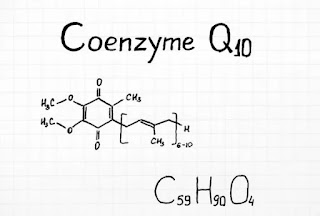Coenzyme Q10 (CoQ10), an Effective Antioxidant for Heart Health
Introduction
The heart is the principal pump of the circulatory system, ensuring that blood, oxygen, and nutrients reach all parts of the body. A functioning digestive tract is able to pump blood normally and efficiently.
There are a number of important elements that can affect cardiovascular health.
Alternative ways of life:
The way you typically go about your daily activities might have a significant effect on your cardiovascular fitness. Several factors, including poor dietary choices, lack of exercise, tobacco use, and excessive alcohol intake, are associated with an increased risk of cardiovascular disease. However, a heart-healthy lifestyle includes eating well, exercising regularly, and avoiding dangerous substances.
Genetics:
Those who have a family history of heart disease are more likely to have cardiac issues themselves. Conditions like high blood pressure and excessive cholesterol are examples of those that might negatively affect cardiovascular wellness.
Problems with your health that run deeper:
Other diseases and illnesses, such as diabetes, obesity, and kidney disease, can also raise the odds of developing cardiovascular issues. Correct treatment and management of these underlying disorders is crucial for maintaining cardiovascular health.
The chance of having heart disease rises in tandem with age. Older people should take care of their hearts by getting frequent checkups and medical treatment as necessary.
Coenzyme Q10 and Cardiovascular Health
Coenzyme Q10 (also known as ubiquinone) is a naturally occurring molecule that functions as an energy source. It also acts as an antioxidant, blocking the effects of potentially dangerous molecules called free radicals.
Some research suggests that having low levels of coenzyme Q10 (CoQ10) is associated with an increased risk of cardiovascular disease, and taking a supplement containing CoQ10 has been found to improve heart health. However, additional research is needed to understand the connection between CoQ10 and heart health, and the data in this area needs to be more mixed.
Although study findings have been inconsistent, some research suggests that taking CoQ10 supplements may assist improve heart function in people with heart disease. Coenzyme Q10 supplementation has not been shown to improve heart health in other research.
No nutritional supplement can take the place of a healthy diet and regular exercise. The best method to keep your heart healthy is to follow a healthy diet, engage in regular physical activity, and learn to control your stress levels. So, you're thinking about improving your heart health by using CoQ10 pills. If that's the case, you should consult your doctor to find out if the treatment is safe for you and to learn about any potential benefits.
The physical consequences of a cardiac condition
Heart problems can have serious consequences for the rest of the body. The effects of a heart that isn't strong enough to handle its workload include:
Difficulty breathing: Exercising, in particular, can exacerbate the effects of weariness and shortness of breath that result from a weak heart.
Weakness and exhaustion might result from the heart's inability to provide the body with enough oxygen.
To put it simply, chest pain is brought on by fluid building up in the lungs because of poor blood flow owing to a weak heart.
Leg, ankle, and foot edoema can occur when the heart is unable to pump blood efficiently, resulting to an accumulation of fluid in the body.
If a weak heart is not treated, it can lead to heart failure, which is characterised by a decrease in the amount of blood pumped by the heart. Shortness of breath, tiredness, and edoema are just some of the symptoms associated with heart failure.
People with weak hearts are more likely to experience irregular heartbeats, commonly known as arrhythmias, which have been linked to an increased risk of stroke and other serious health issues.
Coenzyme Q10 (ubiquinone) and Its Functions
Many potential pathways have been identified through which CoQ10 may affect cardiovascular function. It should be noted, however, that more work is needed to strengthen the available data in this regard.
The creation of energy: CoQ10 is essential for the production of energy in cells, particularly cardiac cells. It plays a role in the cellular energy production process known as the electron transport chain (adenosine triphosphate). CoQ10 may enhance heart function, lessen fatigue, and lessen the risk of heart disease by facilitating energy production in the heart.
CoQ10 has antioxidant actions, meaning it can help keep cells safe by neutralising harmful free radicals. Oxidative stress, caused by free radicals, has been related to cardiovascular disease and other ailments. CoQ10 may help lower the risk of heart disease by decreasing oxidative stress and inflammation.
CoQ10 may have a beneficial effect on blood pressure management, according to certain studies. Untreated high blood pressure is a leading cause of heart disease because it weakens the heart and arteries over time. Coenzyme Q10 (CoQ10) may affect blood pressure, but the particular mechanisms by which this occurs are not fully understood.
CoQ10 has been proven to influence lipid metabolism, which is the process by which lipids are made, transported, and broken down in the body. CoQ10 may reduce the risk of cardiovascular disease because it enhances lipid metabolism, resulting in lower cholesterol and less likelihood of fatty deposits in the arteries. Potentially useful in lowering the danger of cardiovascular disease and stroke.
Ubiquinone (CoQ10) from Ephuroalabs.com
EphuroaLabs CoQ10 Ubiquinone, the best-selling supplement in the world, has no genetically modified components and no artificial flavours. Products are designed to help you maintain your vitality and health. These supplements support your joints in particular, while CoQ10 benefits every cell and decreases pain.
Conclusion
There are many aspects of one's life that are affected by their heart health. Maintaining a healthy heart is a continual process, but it is possible to make progress by modifying one's lifestyle and becoming aware of one's personal risk factors.

.jpg)
Comments
Post a Comment